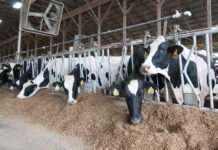Debbie Bearden envisions making rural Kansas a place where young people want to stay. The third-generation Kansas Farm Bureau leader wants her two young grandchildren growing up in a Sunflower State where fruit orchards and vegetable gardens abound.
On May 8, the southeast Kansas farmer meets community leaders with similar dreams. The occasion is a Salina symposium for local food and farm councils. These grassroots entities promote both the supply of and demand for nutritious locally-sourced food.
Bearden is an appointed member of the Allen County Food and Farm Council. In recent years, councils have formed in 33 of Kansas’ 105 counties. Ten more are being planned.
Bearden says councils succeed by channeling people’s passions into community projects. “The incentive to form a council comes from residents themselves recognizing that they can have a positive effect.”
Facilitating these activities is the Kansas Alliance for Wellness—a project of the Midwest Affiliate of the American Heart Association.
AHA’s Topeka-based advocacy project director Missty Lechner says: “Debbie Bearden exemplifies how community members can start with a vision and build that vision into a reality. Debbie has inspired many rural Kansas towns to take the first step of starting discussions between farmers, businesses, nonprofits, and health service providers. New relationships can lead to effective partnerships.”
Allen County’s council—authorized by a 2014 board resolution—seeks to increase access to healthy food options for all 12,951 residents. The county poverty rate is 18 percent, the obesity rate 37 percent.
The Council is called “Growing Rural Opportunities Works.” GROW’s appointed members come from all nine communities countywide. They represent every food-related sector—including eaters. There are several farmers, a medical doctor, a restaurant manager, a small grocer, a hospital dietician, a school nutritionist, a food bank manager, local Extension staff, a college student and a high school freshman.
GROW works on multiple fronts. This spring, 20 vendors are selling products at the farmers market which has expanded from one venue to three on different days. A “mobile market” is being planned. Menus at the county’s half-dozen local restaurants now include nutritional information. The Allen County Regional Hospital plans to make healthy options available in its vending machines.
Meanwhile, 110 residents have each bought $100 ownership shares in a retail food co-op. The Marmaton Market’s start-up costs will exceed $500,000. Area community colleges and high schools are receptive to creating a program to teach students how to grow vegetables.
Bearden says the new federal Farm Bill can help communities figure out how to grow their own food economies. She’s explained to staff of U.S. Senate Agriculture Committee chair Pat Roberts how federal policy can impact nutrition: “We have to be able to increase the amount of locally produced specialty crops.”
She favors a federal program that leverages public and private funds to increase low-income consumers’ purchasing power for nutritious food. (How Kansans benefit is referenced in a new report “Power of Produce: Healthy Food Incentives Empower Families, Support Farmers and Lift Up Communities.”)
Bearden also supports the proposed Local FARMS Act. Senate Bill 1947 would encourage public-partnerships that align private funding/finance sources to support regional food economies.
Local food is energizing the community-building work of grassroots councils. It also spells opportunity for commodity farmers and ranchers looking to sustain the family business.
“Farmers are farming all the land they can,” she explains. “And they’re running all the cattle they can. But most realize they still need to do something different to make room for the next generation. The biggest pop will come from a two-acre patch of lettuce or anything else to supply the farm-to-table market.”
By Bob Heuer
Bob Heuer is an Illinois-based public policy and marketing strategist. He can be reached at [email protected]



